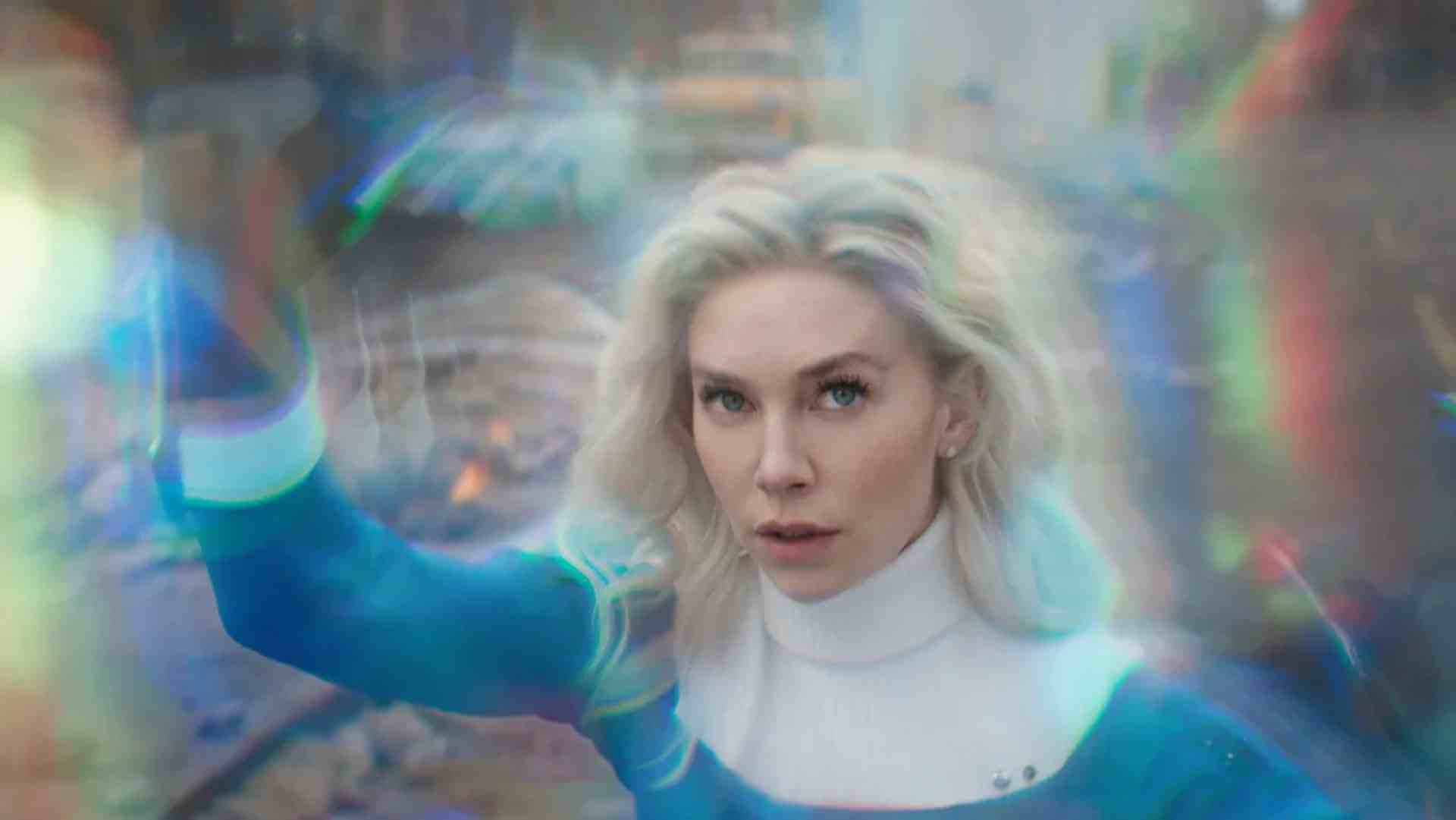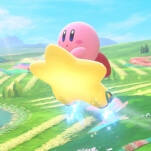The following contains spoilers for The Fantastic Four: First Steps.
Before Marvel’s new Fantastic Four journey up to space to try to stop a giant cosmic being from taking a bite out of their planet, Sue Storm (Vanessa Kirby) gets a gentle reminder from her husband Reed Richards (Pedro Pascal). Whatever she does next, it will be “the first time a pregnant woman has done it in the history of the world.” And that’s not just true from an in-world perspective either. After over two-and-a-half decades of non-stop live-action comic book storytelling, The Fantastic Four: First Steps is the first superhero movie to center on a pregnant protagonist and—one harrowing space birth later—a new mom.
Genre stories so often use pregnancy and childbirth as metaphors that it almost takes a second to wrap your mind around the fact that’s not what’s happening here. Though Sue and Reed’s soon-to-be-born son Franklin is a plot point and sort-of-MacGuffin in First Steps, her pregnancy is just a matter-of-fact part of her character. It’s a big deal in that she’s the first pregnant superhero to fly across the cosmos to negotiate with a space god. And also it’s not a big deal, in the sense that she does what so many pregnant people have done throughout history: Throw on a cute maternity outfit and go about her life and career like normal.
Given how uneven female representation has been in superhero movies and how fraught cultural conversations around both pregnancy and motherhood can be, the MCU’s choice to debut its new Sue Storm with this storyline in particular will surely generate myriad responses. But those responses can sometimes reflect as much about our own biases as anything else. For instance, some critics have already claimed Sue is reduced to “just a pregnant wife” in First Steps, even though she’s no more defined by being a wife than Reed is by being a husband. (It’s an ensemble movie in which they both get independent careers outside of their superheroism—him in science, her in diplomacy.) Nor is it easy to imagine people complaining that the Reed in this movie is “just a dad,” even though his arc is as much about the baby as hers.
Indeed, making a superhero a father is a go-to way to add depth to their stories. As the genre’s target audience has aged into parenthood, so have its heroes. In the past decade, everyone from Tony Stark to Wolverine, Aquaman, Thor, Bruce Banner, Hawkeye, and T’Challa have welcomed bundles of joy to carry on their onscreen legacies. (Ant-Man, of course, was defined by fatherhood from the beginning.) And we don’t see that as a weakness because superhero movies have trained us to see fathers as complicated, nuanced figures around which our heroes define their values—from Uncle Ben’s “with great power comes great responsibility” speech to Howard Stark’s withholding genius to Superman’s dual set of dads to Thomas Wayne’s “Why do we fall?” mantra to Yondu’s Mary Poppins moment.
Motherhood, however, isn’t framed in the same way. Up until quite recently, moms in superhero movies tended to be depicted as simple, sweet sources of comfort and love; the kind who can be killed off or kidnapped when the hero needs some extra motivation, but not complex or inspiring figures in their own right. While movies like Black Panther, Wonder Woman, and Black Widow have started to even the scales with more complicated, heroic mother figures, the imbalance isn’t totally gone. In James Gunn’s Superman, for instance, Pa Kent is still the one to give the empowering speech that fleshes out his character while Ma is just generally supportive in the background.
But while it’s true that motherhood has been used as an excuse to reduce female characters, there’s also a risk of applying that logic backwards too—of assuming that motherhood is an inherently reductive role for women, even when they’re literally the protagonist of the story. If our male superheroes can get depth by becoming parents, why can’t our female ones? And while First Steps isn’t the be-all-end-all of motherhood representation, it joins WandaVision and Agatha All Along as Marvel projects that are at least broaching the topic in ways that open up new live-action superhero storytelling potential. (Shout out to The Incredibles for getting there first in animation!)
One of the refreshing things about Sue is that she’s not coded in the sort of snappy, sarcastic way that can be a default for “Strong Female Characters.” Like the rest of the Fantastic Four, she’s an introverted, analytical scientist with a lived-in maturity. Her particular gift (beyond invisibility and forcefields) is communication and conflict resolution—a skill she’s taken to The Future Foundation as a diplomat, with a specialty in global demilitarization and mole-person negotiation. There’s something quite Star Trek-y about this film’s take on the Fantastic Four, and if Reed is the science officer/engineer, Ben Grimm (Ebon Moss-Bachrach) is the pilot, and Johnny Storm (Joseph Quinn) is the security officer, Sue is like the captain of the ship. When the Silver Surfer (Julia Garner) swoops into Times Square and asks if the Fantastic Four are the protectors of this world, Sue is the one to confidently answer “yes” while the boys look on in confusion.
Those are actions of a hero irrespective of her pregnancy, but the movie delves into some specifics around that too—as it does for Reed. Sue is generally calmer about impending parenthood than her anxious husband. (The idea that she can basically conduct her own ultrasounds by turning her belly invisible is a delightfully out-there sci-fi touch.) But she’s still allowed to freak out when Galactus demands, fairytale-style, that she hand over her baby to sit on his throne, then zaps her into labor.
Sue’s vengeful mama-bear instincts come out as she screams at Johnny to kill the Silver Surfer. But she manages to superheroically hold it together long enough to turn the entire ship invisible in between contractions. She also gets a nice bit of (literal) grounding from Reed as she gives birth in zero-gravity. And while the movie’s take on childbirth and newborn size/neck strength is as questionable as it is in every Hollywood film, director Matt Shakman at least tries to acknowledge the exhaustion of early parenting and give Sue some slouchy postpartum fits before she eventually gets back into her superhero spandex.
Once back on Earth, First Steps settles into an extended Trolley Problem about whether to give up baby Franklin to save the planet. And the movie uses that dilemma to engage with its motherhood theme in a couple of different ways. Sue’s most overt act of heroism comes at the end of the movie as she, “mom lifting a car to save her kids”-style, uses her forcefields to push the skyscraper-sized Galactus through the streets of New York and into an interdimensional portal in order to save her infant son and her planet. She even briefly gives her life in the process, until her mysteriously powered baby revives her at the last second.
It’s the same sort of love-as-fuel heroism that inspires Christopher Reeve to turn back time in 1978’s Superman or Peter Quill to avenge his mom in Guardians Of The Galaxy Vol 2. And it’s also the same kind of self-sacrifice and last-minute save that big screen heroes like Iron Man, Wolverine, Deadpool, Thor, and Batman (not to mention Johnny in this very film!) have all used to prove their heroism. If it feels a little different it’s because of real-world context—Sue is the only female hero on the team, there’s a long history of fridging women in genre properties, and there’s a real-life expectation that mothers should give everything for their kids that skews her actions as more obligatory than heroic.
Still, within the context of the film, it’s an undeniably badass moment in which Sue levels up beyond what her teammates are capable of; proving once again that she’s the true leader of the group. And it’s strengthened by the movie’s other approach to its central Trolley Problem, which comes in the second act. After the Fantastic Four return home following their first brush with Galactus, Reed reassures the populace that they won’t sacrifice Baby Franklin to save the Earth. Only it turns out humanity would prefer to preserve themselves no matter the cost to their First Family.
Though the movie doesn’t put too fine a point on it, there’s a fascinating through-line about how the arrival of superheroes might make humanity lazy and codependent—like children who expect their parents to cater to their every whim, no matter the cost. After four years in which the Fantastic Four have basically solved all the world’s problems, people are indignant that they won’t just hand over their baby and solve this one too. And after Reed’s scattered post-space-travel speech, it takes Sue The Communicator to step in and gently parent the Earth about why that’s an inappropriate thing to ask.
Literally, Sue’s speech is a mother protecting her child. Metaphorically, it’s a super-mom drawing a firm boundary with the eight billion people who view her as an endless source of Giving Tree-style selflessness. She won’t give up her baby to save the planet, but she will help the people of Earth work together to save themselves, harnessing Reed’s brain and her knack for collaboration towards a “historic mobilization of every country working together like never before.”
In that way, Sue gets to be not just a classic self-sacrificial mom, but a woman who prioritizes her own wants too. One who inspires others to be better, but won’t give everything to them. That reframes her final act as a choice, rather than an expectation. It also establishes her as someone who doesn’t just save Franklin in the moment, but has an actual heroic set of values to pass on to him. Though the movie largely drops the global unity angle once the plan goes wrong and Galactus arrives, it’s still an intriguing glimpse at the sort of stories superheroes could explore if motherhood was as central as fatherhood.
Of course, the MCU’s take on The Fantastic Four is far from a paragon of female representation or a flawless depiction of motherhood. No single superhero film could be. But it’s certainly a step up from Doctor Strange In The Multiverse of Madness, in which Wanda Maximoff (Elizabeth Olsen) turned into a crazed mom villain and then unceremoniously died, or from an adjacent property like Star Wars: Episode III—Revenge of the Sith, in which the second Natalie Portman’s Padmé Amidala gets pregnant, she loses her personality and all but drops out of the story. Before this, the best the big-screen MCU had to offer was a pregnant Laura Barton (Linda Cardellini) totally supporting her husband’s Avenging. Now we’ve seen a pregnant hero actually doing the avenging herself. That’s a welcome first step.









































